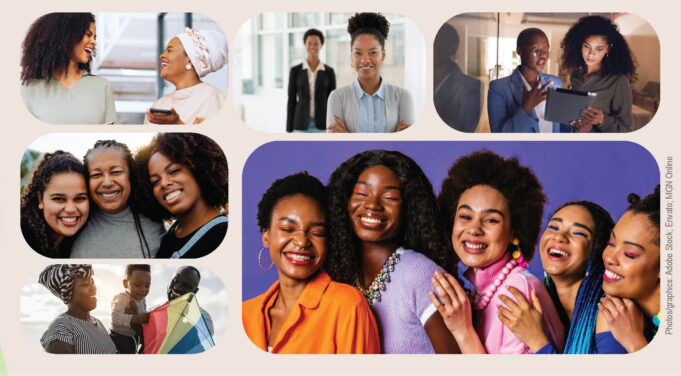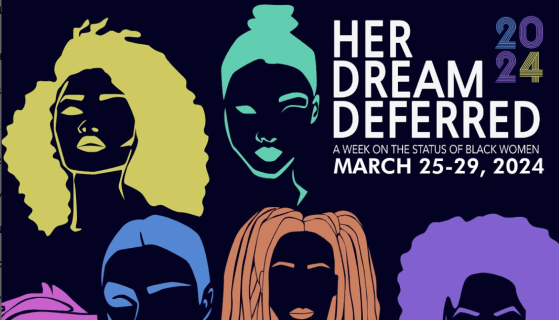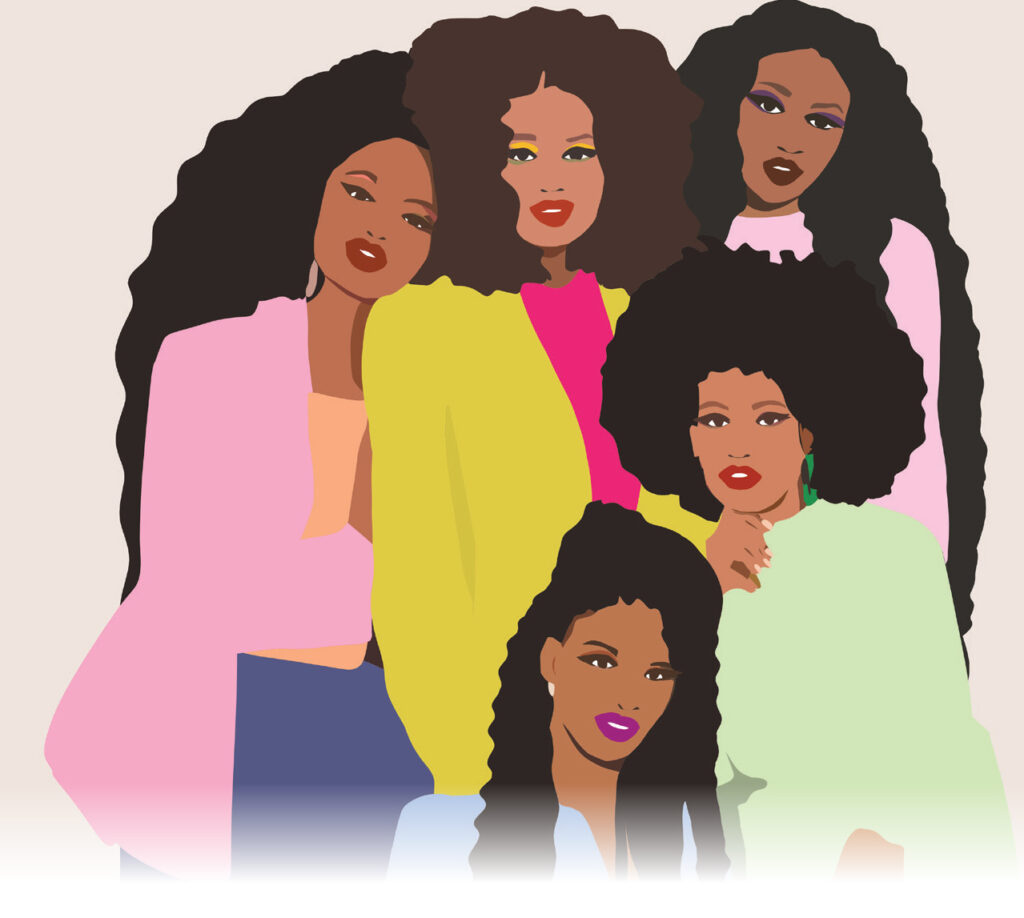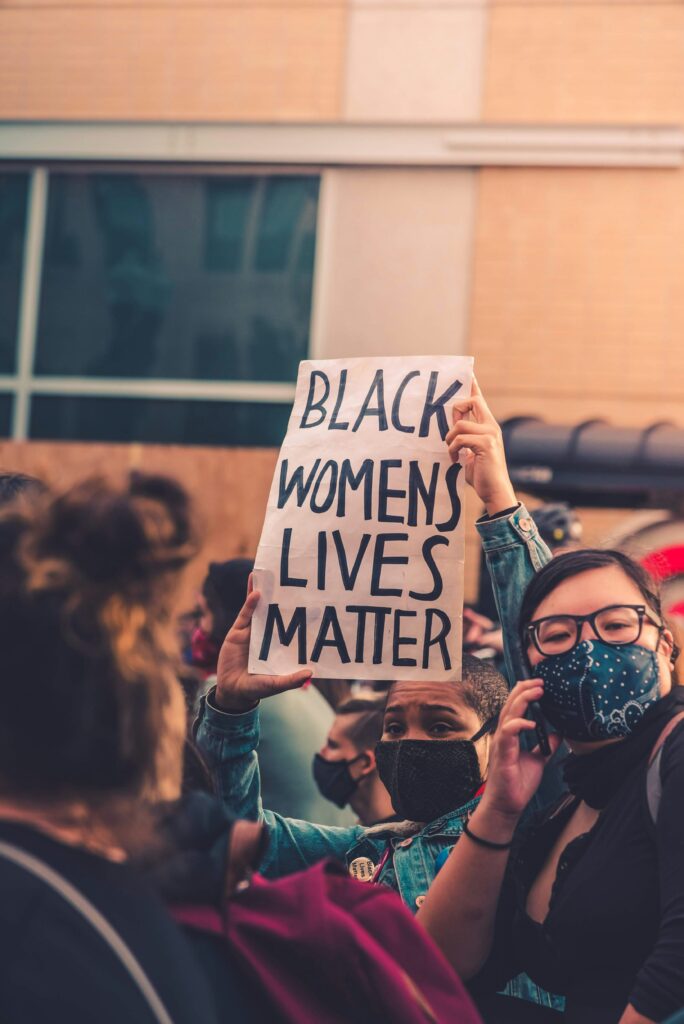In the myriad of societal struggles, the triumphs, challenges, and issues faced by Black women and girls remain marginalized and their voices muted in the cacophony of societal concerns.
Beneath this veil of silence lies profound crises that demand urgent attention and concerted action, and those include police violence, Black maternal and infant mortality, and education, according to advocates and activists.
“The disregard of Black women and girls isn’t just the outcome of racism or sexism, it’s a part of a larger, coordinated assault on civil rights & democracy. We have become the most visible targets of the war on ‘woke’ that has unleashed a fury of attacks against anti-racism,” tweeted legal scholar Kimberlé Crenshaw, co-founder and executive director of the African American Policy Forum, (@sandylocks on X/Twitter) on March 26. That was the second day of “Her Dream Deferred: African American Policy Forum To Shed Light On Issues Impacting Black Women.” It is the 2nd annual week on the Status of Black Women from March 25-29, featuring a variety of activities, panels, artistic performances, workshops and lectures, elevating the stories and perspectives of Black women and girls across the U.S.
Prof. Crenshaw recently lifted the name of Michelle Cusseaux and countless other Black women killed by police. No one was paying attention to their deaths, stated Prof. Crenshaw, who is also co-author of “#SayHerName: Black Women’s Stories of Police Violence and Public Silence.”
Michelle was killed in her own home (2014) when a police detail was dispatched to her house on a mental health call, Prof. Crenshaw told an audience at the Philadelphia Free Library in November 2023. Michelle’s death came five days after Michael Brown, Jr. was killed in Ferguson, she noted. Michelle’s mother, Fran Garrett, carried a white coffin around downtown Phoenix with a few others shouting, “Justice for Michelle!” She’d decided that she was not going to let the world forget or ignore the fact that her daughter, Michelle Cusseaux, was senselessly killed by the police, said Prof. Crenshaw.
“While Michael Brown’s killing justifiably sparked a wave of nationwide protests over lethal police shootings of Blacks the killing of Black women like Michelle had yet to be memorialized in widespread activations and denunciations,” stated Prof. Crenshaw, at the library. “Fran’s act reminded us all of the obvious fact that slain women’s mothers don’t grieve for them any less. Their children don’t cry for them any less. Their siblings don’t mourn them any less. And we should not protest their killings any less than we do the killings of their brothers, fathers and sons,” she continued.
Black girls as young as seven and women as old as 93 have been killed by police, indicates the African American Policy Forum. Black women comprise approximately 10 percent of the U.S. female population, yet account for one-fifth of all women and almost one-third of unarmed women killed by the police, it continued. The #SayHerName campaign marked its 9th anniversary in December 2023.
In addition to police violence, for Black women, this intersectionality manifests in a myriad of challenges, encompassing systemic racism, gender inequality, economic disparities, and more.
Due to systemic racism, in both public and private spheres, Black women encounter structural barriers that impede their advancement and erode their well-being. From employment discrimination to disparities in healthcare access, the effects of systemic racism and gender bias reverberate across every facet of Black women’s lives, perpetuating cycles of inequality and injustice.
Injustice often plays out in healthcare, a fundamental human right, which remains elusive for many Black women, ensnared in a web of disparities and inequities. From maternal mortality rates to access to reproductive healthcare, Black women confront systemic barriers that compromise their health and well-being. Structural racism within healthcare systems exacerbates these disparities, perpetuating a cycle of neglect and injustice that undermines the health of Black women and their communities.
Meshawn Siddiq, executive officer and founder of H.E.R. (Health Education Research) Institute, created it to improve the birthing and breastfeeding outcomes of women. “It’s all about health, but I feel like in order to improve the health, individuals need to be educated,” she stated. The individuals would not just include the person, but also stakeholders, policy makers, and health care providers.
Ms. Siddiq, who is also a registered M.G.T. and G.C.C. (Muslim Girls Training and General Civilization Class) in the Nation of Islam’s Muhammad Mosque No. 46 in New Orleans, Louisiana, advocates for research, saying in order to make improvements, it’s imperative to know the problem. “That’s not just collecting data, as far as numerical data. It also means taking qualitative data, listening to the voices of those who have lived experiences,” she said.
Her research found that education and understanding about their bodies, how it functions, and what it goes through physically, emotionally and spiritually, is a key issue facing Black women and girls in America as relates to health care.
“I’ve learned that we don’t know what our breasts are for. We don’t know that it’s made to produce milk. We don’t know the reproductive cycle. We don’t understand how that works in our day-to-day lives,” Ms. Siddiq said.
Her research also found that providers are not listening to the voices of women, she said.
“There is an intuition that we do have about our bodies and understanding that something is just not right, and many of the issues that are going on with our poor, our Black maternal mortality rate, and our infant mortality rate is really stemming from providers not understanding that women and families have voices and how do we treat Black women,” she said.
A 2022 Pew Research study found that 63 percent of Black women say they’ve experienced at least one of seven negative healthcare experiences, the most common experience being that they were not taken seriously. The other six experiences were: having to speak up to get proper care, being rushed by their health care provider, a feeling of being treated with less respect than other patients, a feeling that they received lower-quality care than other patients, that they were looked down on due to weight, and that their women’s health concerns were not taken seriously, wrote Final Call staff writer Tariqah Muhammad in The Final Call Vol. 42 No. 29.
In Inglewood, Calif., April Valentine thought she was going to deliver her firstborn like any other mother at Centinela Hospital. However, in just 24 hours, she died before meeting her baby girl, The Final Call recently reported. The 31-year-old mother’s family said that hospital staff ignored her complaints of pain and swelling and denied her doula being present.
“The research is showing that Black doctors who treat Black women and Black children have better outcomes than those other White providers,” Ms. Siddiq said. In her work, the number one issue is Black women understanding their rights and that they have a right to birth peacefully, she said.
“They have a right to breastfeed. They have a right to be supported, and when all of that is taken away from them, this is when the trauma happens to our families,” Ms. Siddiq said. However, she said, there is a wave of Black women leaders who understand that they have power and there is power in numbers.
The biggest triumph in her area is that she is in collaboration with 30-40 Black women leaders—from health care providers, public health professionals, patient consultants and policy makers—who understand that in unity, they accomplish much, Ms. Siddiq said. Their efforts have garnered more resources and funding to help fill in the gaps.
“We’re not operating in silos. We’re not competing with each other, and I think that is the biggest triumph, that we, as Black women leaders, understand who we are and what our job, our assignment, our mission is, and we are pushing forward together in that,” she added.
Working to help curb the problem is the Atlanta, Georgia-based Black Mamas Matter Alliance, a national network which advocates for the rights, respect and resources for Black mamas to thrive before, during and after pregnancy, has planned a week dedicated to educating and advocating for Black Mamas. Through its annual Black Maternal Health Week (April 11-17), it has planned a series of digital events and community engagement, to focus on the root causes of poor maternal health outcomes, while engaging Black voices to lead immediate conversations around community-driven policies and programs.
Bertha Lewis, president and founder of the Black Institute, New York, told The Final Call that any issue in general affects Black women and girls disproportionately. For instance, education, she said. “We see a move toward privatizing education as opposed to public education: and we know that the demographics of this country are changing, so most of the children that will be in school will be children of color, so when you begin to privatize education, you’re trying to make money off of mostly children,” Ms. Lewis said.
“Black girls, in particular, have a challenge in our school system because of misogyny and racism and Black girls are challenged constantly in the school system. However, the triumph is that regardless as to these challenges, our Black women and Black girls in the education system continue to rise,” she said. That’s in graduation rates, college degrees, and entry into the work force, according to Ms. Lewis.
In speaking about his teacher the Most Honorable Elijah Muhammad, the Honorable Minister Louis Farrakhan explained that civilization is measured by the woman and that if you want to take the world down, the place of attack is the female, but if you want to build a world up, you start with the female. Both of these Divine Servants of Allah (God) teach that the protection and elevation of women and girls are key for the progression of society and that the misuse and abuse of women and girls is not justified. When somebody wants to take the world down, they destroy the value of knowledge in a woman, the Minister stated in a message, titled “The Value of the Female,” delivered in 2005.
“When you deny education to the female, you are denying it to a nation. When you deny education to a man, you have denied education to an individual. When you deny it to a woman, you have denied it to an entire people. That’s how valuable a woman is,” the Minister stated.
Homelessness and economic disparities further exacerbate the crisis facing Black women, relegating many to the margins of society’s prosperity, advocates noted. They offer that addressing the crisis facing Black women requires a multifaceted approach—one that acknowledges the intersectionality of their experiences and confronts the root causes of systemic injustice. It demands policy reforms that dismantle barriers to equality and justice, investments in economic empowerment and healthcare access, and the amplification of Black women’s voices in public discourse and decision-making processes.
“In Women’s History Month, we should recognize that Black women and girls are the most discriminated of the discriminated. Just now we’re having a debate about Black maternal health, just now,” Ms. Lewis emphasized.
















